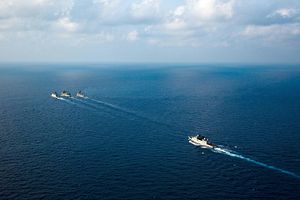By Luke Hunt
 A starkly changed world has fired up Australia, prompting a realignment in its relationships with India, Indonesia, and the Pacific, backed by a substantial increase in its defense budget.
A starkly changed world has fired up Australia, prompting a realignment in its relationships with India, Indonesia, and the Pacific, backed by a substantial increase in its defense budget.
Earlier this week Canberra announced it would spend $186 billion on its military – including long range missiles – over the next decade amid rising tensions in the Indo-Pacific region, where China has enjoyed flexing its political, financial and military clout in recent times.
Prime Minister Scott Morrison refrained from naming China as he pressed home Australia’s needs by defining a post-COVID world “that is poorer, that is more dangerous and that is more disorderly.”
Beijing had enjoyed cordial relations based on mutual prosperity with Australia under successive leaders, from Deng Xiaoping in the 1990s to Hu Jintao. But its big-bully approach under President Xi Jinping has soured ties.
Indonesia and India have had similar experiences as China expands its maritime presence over international waters, from the South China Sea and into the Indian and Pacific Oceans, which has helped forge the Indo-Pacific strategy between the two alongside Australia, the United States and Japan.
A separate trilateral relation between Indonesia, India, and Australia has also found traction in diplomatic quarters for several years and emerged as a foreign policy issue after last year’s elections in Indonesia.
In the 2020 Defense Strategic Update, Australia will increase military spending by 40 percent over the next 10 years, when compared with its previous budget for 2016-2026.
Australia plans to equip its fleet of Super Hornets with long-range anti-ship missiles purchased from the United States. It is also mulling long-range hypersonic missiles to be launched from land, which can travel at more than five times the speed of sound. That is partly in response to China and North Korea’s development of long-range ballistic missiles that can travel at speeds of more than 5,500 kilometers.
In a speech to the Australian Defense Force Academy in Canberra, Morrison said his country “must face the reality that we have moved into a new and less benign strategic era.”
Analysts said increased strike capability will focus on Australia’s ability to protect itself and its regional allies, from tiny island-states in the Pacific to the near-north and west to India.
This era has been described as Australia’s “toughest international situation” since the 1930s during the lead-up to World War II – with common threats to territorial integrity and spheres of influence resulting in alliances once thought unlikely.
The Indo-Pacific strategy has held the long-standing personal support of Indonesian Foreign Minister Retno Marsudi and her foreign ministry, culminating in Indonesia upgrading diplomatic relations with India and Australia.
These are ties born out of Xi’s authoritarian rule and his debt-trap policies in poorer countries around the world – Sri Lanka and Fiji among them – which allowed Beijing to expand its military footprint but at the same time hardened anti-Chinese sentiment.
And China’s baiting of India across their disputed border just adds to its recent history of challenging long-standing norms, seen as a threat to regional peace and stability.
Among the 10 ASEAN countries, Beijing can only count on Cambodia as a true ally while Jakarta, the sole powerhouse within the trading bloc, remains deeply upset by Chinese maritime claims in its exclusive economic zone near the Natuna Islands.
As defense analyst Mohan Malik, formerly of the Asia-Pacific Center for Security Studies, told this journalist: “Indonesia wants to be a global maritime fulcrum.”
That will also challenge ASEAN’s role in the region. Smaller countries are caught in a tense geopolitical struggle between China’s political ambitions and a status quo that emerged after World War II and was finessed in the post-Cold War era.
It’s a total reshaping of the political and military landscape that stretches across South and East Asia, and into across the Pacific where Australia has raised the stakes, just a notch.
No comments:
Post a Comment